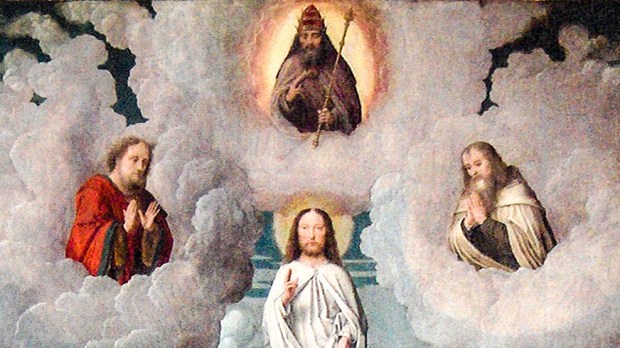Jesus took Peter, James, and John and led them up a high mountain apart by themselves. And he was transfigured before them… Then a cloud came, casting a shadow over them; from the cloud came a voice, “This is my beloved Son. Listen to him.” —Mark 9:2, 7
In her Revelations of Divine Love, the medieval mystic Blessed Julian of Norwich wrote:
I saw Him and still sought Him,
For we are now so blind and so unwise that we never seek God
until He of His goodness shows Himself to us;
and when we see anything of Him by grace, then are we moved by
the same grace to try with great desire to see Him more perfectly.
And thus I saw Him and I sought Him,
and I possessed Him and I lacked Him.
And this is, and should be, our ordinary behavior in life.
Unlike Dame Julian and other mystics who experience the reality of God’s presence in a unique way, we are often very quick to try to note the distinctions—the boundaries—between the human and the divine. Even our ways of talking about God can make the divine realities seem far-removed from our daily lives. The Church’s greatest minds and grace-filled mystics have understood that our limited human perspectives, especially our words, fall flat when we are allowed even the slightest glimpse of the glory of God.
It’s easy to imagine Mark struggling with the limits of language as the apostles recalled what happened on the mountain that day as Jesus made his way to Jerusalem. Although we often think of the Transfiguration of Jesus—the wonderful way in which the divine glory of Jesus was revealed to Peter, James, and John—as having been for the benefit of the disciples, we can also understand that the Transfiguration, like his baptism by John in the River Jordan years before, was a pivotal moment in the life of Jesus.
The voice of the Father—whose presence was symbolized by the cloud that enveloped the mountaintop—proclaims that Jesus is his own “beloved Son.” These words take us back to the First Reading and the story of Abraham and his own “beloved son,” Isaac. As Adrian Nocent, OSB, observed, “These words of the Father in the story of the transfiguration are full of meaning for us … We can hear in the words an echo of Abraham’s words as he offers the Father his only son. In the case of Christ, the Son has come and offered himself, but he has done so out of obedience and the desire to do the Father’s will.” Nocent concludes, “For his obedience, Christ is rewarded with the transfiguration; the latter becomes the sign of the transfiguration every person will experience who chooses to walk the path of God and do the Father’s will.”
Like Isaac in the Genesis story, Jesus is an innocent victim, but he is one who offers himself for the good of all. In the transfiguration of Jesus we are given a glimpse of the promise of resurrection, even as we are reminded of the sacrifice of a beloved son. The invitation for us on this Second Sunday of Lent is to reflect upon the gift of the Son and to consider how, particularly in these days, God might be asking us to sacrifice something of ourselves for others.
When have you been called to make sacrifices for the sake of another person? How was this a moment of “transfiguration” for you?
When you have a special experience of the presence and power of God, do you want to “build a tent” and remain on the mountain or do you feel called to share the gift you have received with others?
How does the transfiguration of Jesus and the promise of resurrection speak about the promise of new life that shines beyond the many struggles we face each day? How does it inspire you to see God at work in the little crosses that you take up each day?
Words of Wisdom: “Jesus wants us to see his glory, so that we can cling to that experience … When we are attentive to the light within us and around us, we will gradually see more and more of that light and even become a light for others. We have to trust that the transfiguration experience is closer to us that we might think. Trusting that, we may also be able to live our Gethsemane experience without losing our faith.” —Henri Nouwen in Sabbatical Journey

